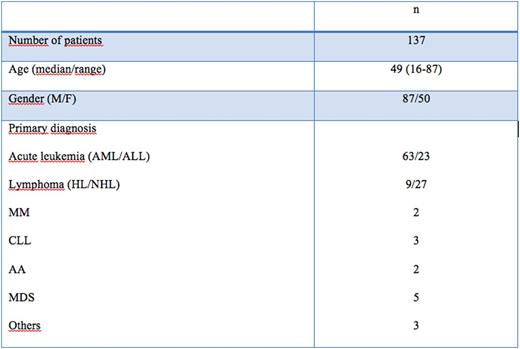Abstract
Introduction: Febrile neutropenia (FN) is an important cause of mortality in hematology practice. Prompt recognition and treatment of FN is crucial to prevent development of sepsis and subsequent mortality. The duration of empirical antibiotherapy in hemodynamically stabile, afebrile, culture negative patients without an infectious focus is a controversial issue. Recently published guidelines encourage the use of early cessation of empirical antibiotherapy in these patients. Here we report our preliminary experience of early discontinuance of empirical antibiotherapy in febrile neutropenic patients who were treated with a risk-adapted strategy.
Methods: All consecutive patients who were treated during June 2014-April 2016 period and presented with FN were included. Demographic and clinical data of patient cohort was prospectively collected within the context of institutional FN registry and analyzed retrospectively. Previously established standard criteria are used to diagnose FN episodes. MASCC score defined the risk category of patients. A new FN episode was considered when FN re-occurred in a patient who remained afebrile for at least 72 hours after discontinuation of antibiotics. All patients were treated within the framework of a written, institutional FN guideline, which is in line with EGIL-4 (European Conference on Infections in Leukemia) recommendations. Empirical antibiotherapy was stopped in patients, who were hemodynamically stabile, had no infectious focus, had negative culture results, received broad-spectrum empiric antibiotherapy for 3 days and were afebrile for at least 2 days.
Results: The study included a total of 137 patients (87 males-50 females). Median age of patients was 49 (16-87). All patients were in high-risk group according to MASSC criteria. Demographic and clinical features of the study cohort are summarized in Table-1. During the study period 249 FN episodes were evaluated. Empirical antibiotherapy was discontinued in 47 (18,9%) FN episodes in 44 (32,1%) patients. Following cessation of empirical antibiotherapy, 11 (23,4%) new FN episodes developed and no patient infection-related deaths in the following 100 days.
Discussion: Our preliminary results indicate that cessation of empirical antibiotherapy in a strictly defined patient population with FN seems to be feasible. We were able to stop antibiotherapy in 18,9% of patients and 76,6% of them did not experience a new FN episode. This strategy is cost-effective and seems to be quite safe, as we did not observed any infection-related deaths in the first 100 days following discontinuation of antibiotherapy. These patients were also protected from possible side effects of unnecessary antibiotics. Future studies will define the role of this provocative approach and may change the way we treat febrile neutropenic patients.
Demirkan:Amgen: Consultancy.
Author notes
Asterisk with author names denotes non-ASH members.


This feature is available to Subscribers Only
Sign In or Create an Account Close Modal